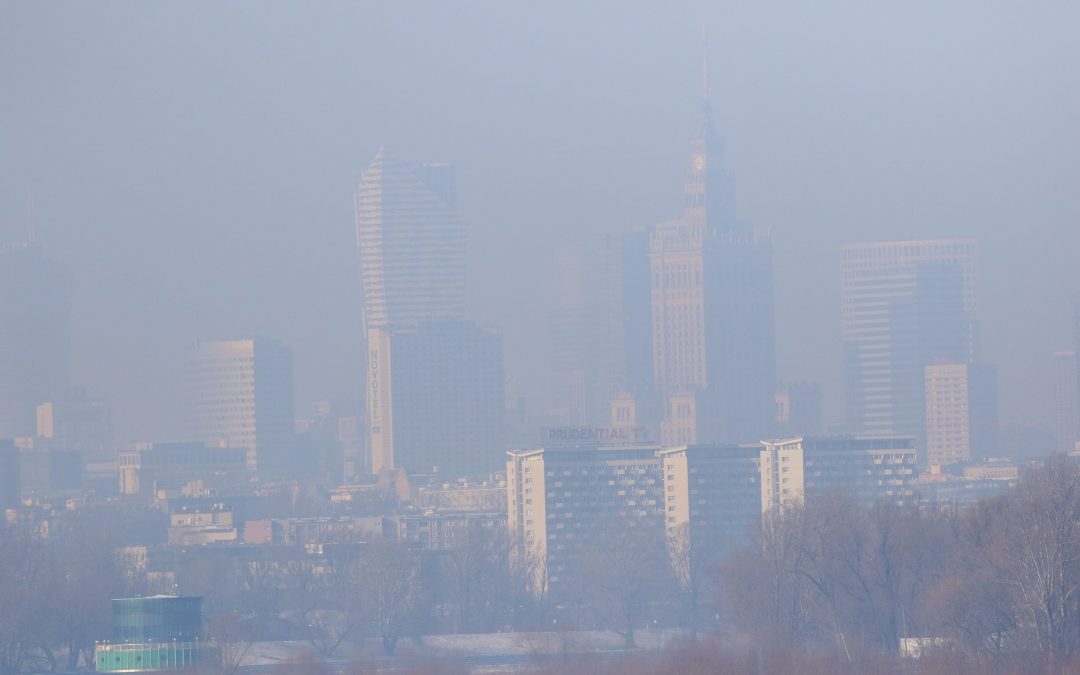The burning of coal to heat households – one of the main causes of Poland’s air pollution, which is among the worst in Europe – will be banned in Warsaw from the start of October next year. In areas surrounding the capital, the ban will come into force in 2028.
The decision was approved yesterday by the local parliament of the Masovia province in which Warsaw is located, with 26 votes in favour and 22 against. A similar ban introduced in Kraków in 2019 is seen to have played a large part in cleaning up what was once one of Poland’s most polluted cities.
“This is a very important day for residents of Warsaw and the surrounding districts,” said Piotr Siergiej, spokesman for Polish Smog Alert, a campaign group. “The chances of breathing clean air in the capital have just increased significantly.”
Unlike Kraków’s stricter ban, the burning of wood will still be permitted. However, the installation of both coal and wood heaters in new buildings that are connected to district heating systems will be prohibited.
In recent years Warsaw has already been running a programme to subsidise the replacement of coal-fired furnaces. But maximum safe levels of airborne particles harmful to humans are regularly exceeded two- or even threefold. This happens for around one third of the year, according to Smog Alert.
Dzień dobry Warszawo😷 pic.twitter.com/xyn7rkWkiC
— Warszawski Alarm Smogowy (@Warszawski_AS) December 12, 2021
The European Environmental Agency (EEA) estimates that around 47,000 people die every year due to poor air quality in Poland, which remains reliant on coal not only for around 70% of electricity production but also for heating many homes.
The national government has in recent years sought to address the issue through its “Clean Air” programme, which aims to replace old heaters and insulate homes. But results have been mixed, with a relatively low uptake of the subsidies on offer, which have recently been increased.
The climate ministry is also working on introducing a ban on burning coal nationwide. It would apply in cities from 2030 and in rural areas from 2040, reported Business Insider Polska in February.
In 2019, Kraków became the first place in Poland to ban the burning of coal and wood for heating. It also launched a mobile app allowing residents to report people they suspected of burning materials – not only wood and coal, but also often household waste – illegally.
Those steps are seen to have been a success, with Kraków’s overall air quality improving over the last three years. The concentration of PM10 particulates and benzo[a]pyrene has decreased 40% since the ban went into place, according to Smog Alert.
However, the city still experiences days with extremely high levels of harmful pollutants, a situation many blame on the fact that bad air comes from surrounding districts where the ban is not in place.
Under a local anti-smog law, old heaters in not only Kraków but the entire province around it are required to be replaced with state-subsidised modern ones by January 2023. However, with around 19,000 furnaces still remaining to be replaced, some officials have sought to extend that deadline, reports RMF24.
Yesterday, municipalities in the Kraków metropolitan area adopted a resolution opposing any delays. We want to “have clean air as soon as possible, not only in Krakow itself, but also in the surrounding districts”, Elżbieta Burtan, mayor of the village of Zabierzów, told RMF.
Poland’s nationwide sheet of smog stems from its use of coal for home heating https://t.co/jfUkdFTXos
— The Economist (@TheEconomist) January 31, 2021
Main image credit: Slawomir Kaminski / Agencja Wyborcza.pl

Alicja Ptak is deputy editor-in-chief of Notes from Poland and a multimedia journalist. She has written for Clean Energy Wire and The Times, and she hosts her own podcast, The Warsaw Wire, on Poland’s economy and energy sector. She previously worked for Reuters.




















